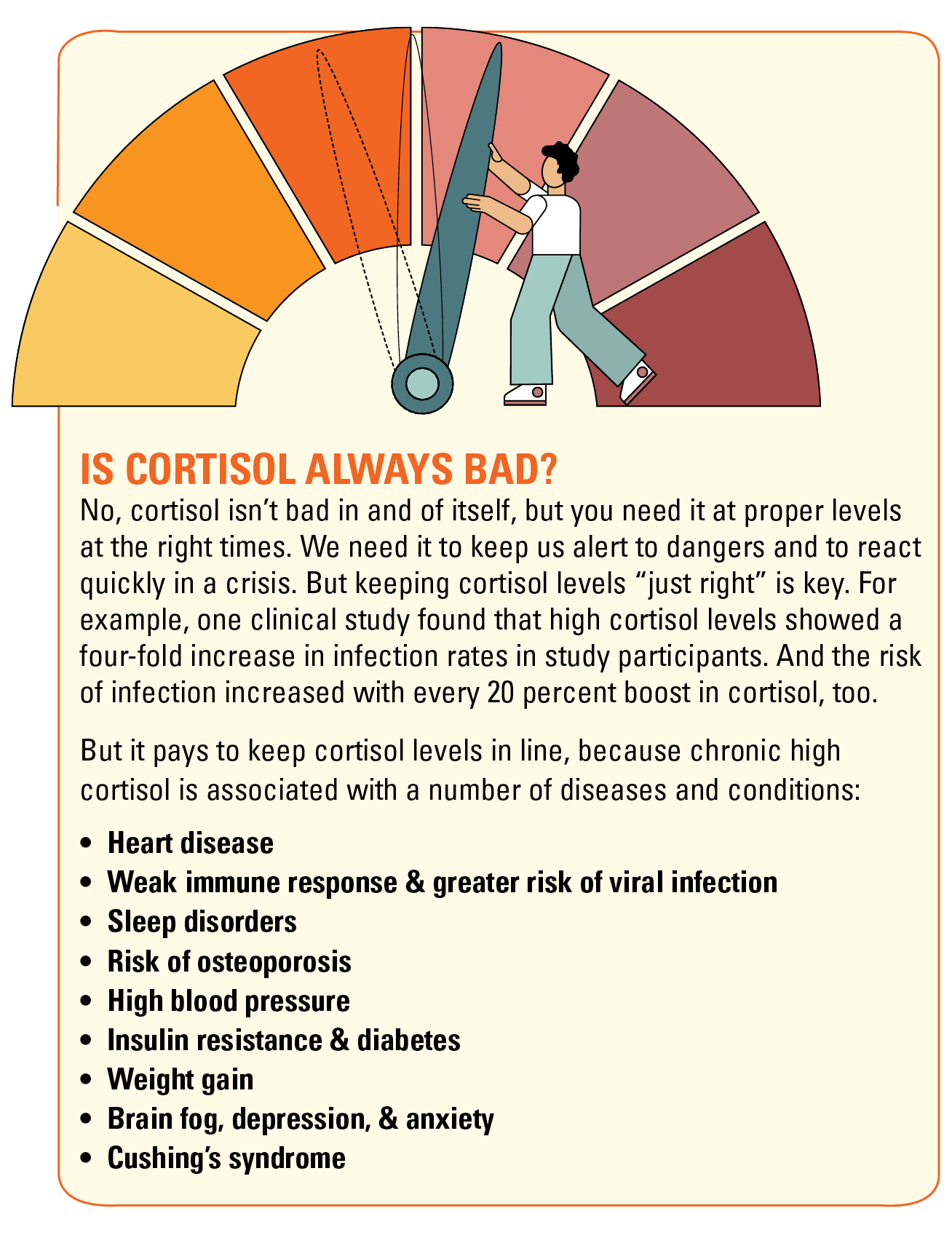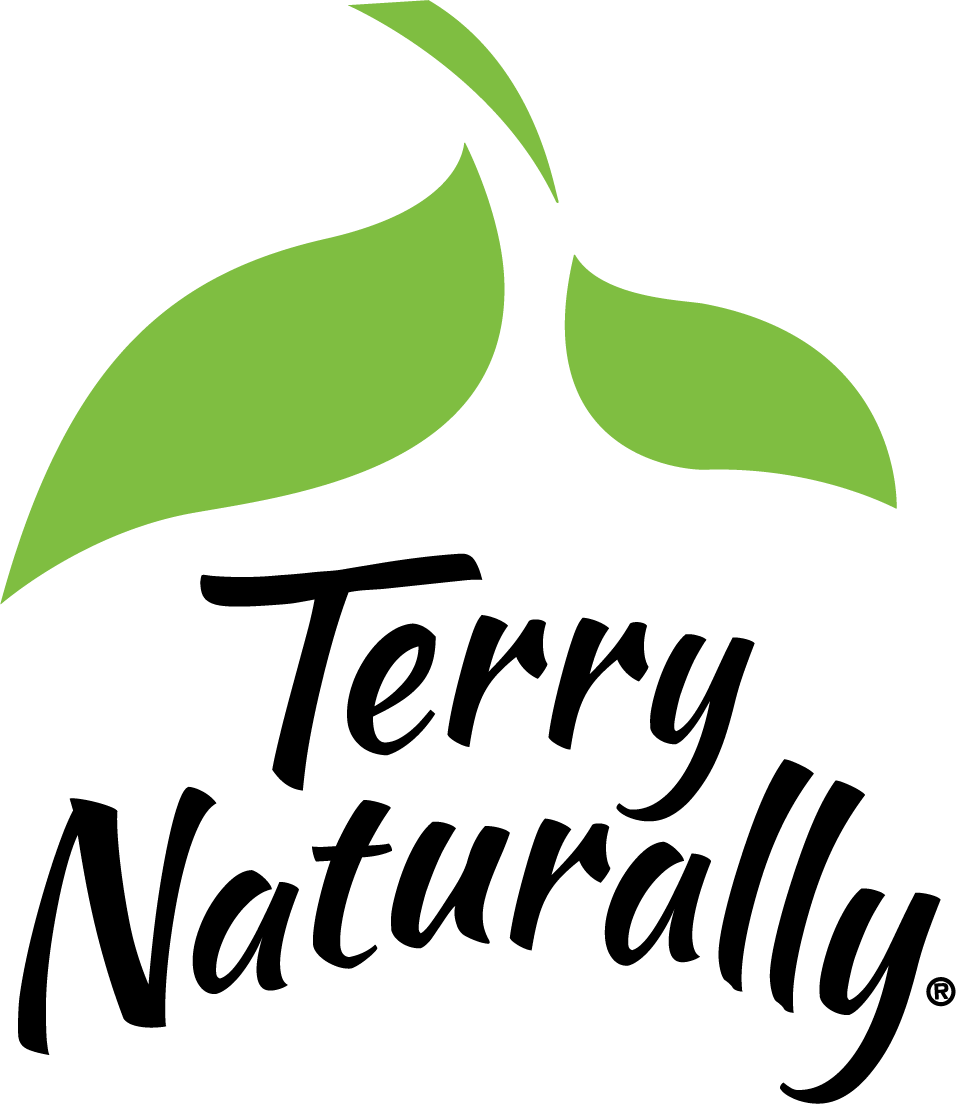Cortisol is a hormone produced in the adrenal glands that boosts our alertness and awareness. Activated at the right times and at the right levels, cortisol helps us wake up with energy, drive carefully in heavy traffic, or use caution when hiking new trails. In situations like these, it’s completely normal for your cortisol levels to go up.
But, imagine what happens when we’re always stressed, fearful, worried, or on alert. Or, when our cortisol spikes just before we need to get some rest. Between frequent, heightened surges of cortisol and the inevitable drop in the hormone, chronic exhaustion without the benefit of relaxation is bound to follow.
If this sounds familiar, if you feel trapped in a cycle of stress, cortisol overload, and adrenal fatigue, the good news is, there are nutrients that can help.
 Bioactive B Vitamins
Bioactive B VitaminsWhen it comes to nutrients that deliver immediate, noticeable benefits, B vitamins rank near the top of the list. Already well known for boosting physical and mental energy, positive mood, metabolism, and concentration, B vitamins also interact with adrenal glands to affect cortisol levels.
B-vitamin supplementation can help the adrenal glands regulate the cortisol awakening response (CAR). This initial release of cortisol in the morning, a boost of about 50 to 70 percent, typically happens in the first 30 minutes after waking up. However, if your adrenal glands are chronically overstimulated and this normal action is thrown off balance, you can suffer from sleep disorders, low energy, and be vulnerable to other illnesses.
The three B vitamins most responsible for keeping cortisol release on track are B6, B12, and folate, also known as vitamin B9. Clinical work shows that supplementing with B vitamins reduces stress for those in chronically stressful work environments, or who just have a hectic and stressful life in general.
While B vitamins seem common enough, there are critical differences in the forms of B vitamins that you should know about when selecting your own. To really make a positive impact on cortisol balance, you need B vitamins in their bioactive forms.
That’s why I prefer vitamin B6 as pyridoxal-5-phosphate (P-5-P), vitamin B12 as methylcobalamin, and folate (B9) as methylfolate. These forms of B vitamins don’t require conversion by the liver to be effectively used by the body because they are already in those forms.
Converting non-bioactive B vitamins like pyridoxine, cyanocobalamin, and folic acid can be a hit or miss prospect for many people. Some individuals simply have a genetic disposition that makes it difficult to get much value from common B vitamins. Other people are already fighting deficiencies in their B vitamin levels because they take prescription medicines. In fact, about up to 30 percent of people taking metformin have reduced levels of vitamin B12 absorption, so it pays to start off with the best forms of B vitamins to ensure results.
Vitamin C
The idea that vitamin C might have anything to do with cortisol may come as a surprise to many people. We usually think of vitamin C as an immune defense booster or as a great nutrient for healing muscle injuries. But proper vitamin C levels are deeply tied to adrenal response, to stress and cortisol release in the bloodstream.
When the adrenal glands are stimulated, vitamin C floods the bloodstream to protect us from inflammation and potential injury. One scientific study found that in laboratory created stress, the concentration of vitamin C in blood heading back to the heart was 70 percent higher than the blood that was being pumped out to the body by the heart. This illustrates how much the adrenal glands (assisted by the liver) were working to keep us safe. But it also shows how much vitamin C can be used up during stress.
Circulating vitamin C helps keep cortisol levels—and stress—in check, so it’s important to replenish your vitamin C every day. In fact, one clinical study found that in just two weeks, boosting intakes of vitamin C reduced high blood pressure, lessened subjective feelings of psychological stress after public speaking and mental arithmetic, and helped cortisol levels recover faster. In other words, vitamin C helps you bounce back better from stress.
DHEA
Along with cortisol, dehydroepiandrosterone (DHEA) is one of the most important hormones released by the adrenal glands during times of stress.
While cortisol is associated with short term, quick reactions to stress, DHEA is involved with long-term responses. The ratio of DHEA to cortisol is crucial: chronically high cortisol release is tough on our emotional and physical well-being; having the right levels of DHEA can help prevent that cycle of cortisol overload.
A four-week clinical study with DHEA supplementation has shown that it lowers cortisol levels throughout the entire 24-hour cycle. That means that if you are seeing imbalances or spikes in cortisol, DHEA can help pull levels of the hormone back into balance. The researchers noted that the effect of DHEA was more pronounced in women than in men, but it was still effective for both, regardless.
One of the reasons that DHEA supplementation has been studied so much in older individuals is that it is common for levels of the hormone to drop as we age. Some estimates say that DHEA levels fall by up to four percent every year in men after the age of 30 or so. For anyone feeling tired, run-down, and overwhelmed, DHEA supplementation may be exactly the right course: it can restore the DHEA to cortisol ratio, improve emotional stability, and shorten healing time from injuries.
DHEA showed positive effects in younger adults dealing with elevated cortisol that interfered with their focus in the afternoon or their sleep in the evening. Normally, those are “trough” periods when you want lower cortisol levels. In seven days, DHEA supplementation brought cortisol levels into line, and improved memory and accuracy as a result.
One thing I’d like to note: while I think DHEA is very helpful, it should only be taken by individuals age 18 and older.
Take Control of Your Cortisol
Cortisol is not our enemy. It keeps us alert and ready to respond. But when cortisol reactions are out of balance, a regimen of bioactive B vitamins, vitamin C, and DHEA can make the difference between taking control of your cortisol or being controlled by it.
What Happens When Cortisol Spikes?
During times of stress, when the adrenal glands release cortisol into the bloodstream, a few things happen all at once:
- Your heart rate and blood pressure go up
- You get a spike in blood sugar levels
- Your muscles get tense
- Your digestion slows down
In a crisis, these reactions may save your life. But when these responses are chronic and seem to happen all the time for the smallest reasons, you need to get cortisol under control.
Is Cortisol Always Bad?
No, cortisol isn’t bad in and of itself, but you need it at proper levels at the right times. We need it to keep us alert to dangers and to react quickly in a crisis. But keeping cortisol levels “just right” is key. For example, one clinical study found that high cortisol levels showed a four-fold increase in infection rates in study participants. And the risk of infection increased with every 20 percent boost in cortisol, too.
But it pays to keep cortisol levels in line, because chronic high cortisol is associated with a number of diseases and conditions:
- Heart disease
- Weak immune response & greater risk of viral infection
- Sleep disorders
- Risk of osteoporosis
- High blood pressure
- Insulin resistance & diabetes
- Weight gain
- Brain fog, depression, & anxiety
- Cushing’s syndrome
To take control of your cortisol, I suggest taking Vitamin C (as ascorbic acid), Thiamin (B1) (as Thiamin HCI), Riboflavin (Vitamin B2), Niacin (Vitamin B3) (from niacinamide and as niacin), Vitamin B6 (from pyridoxal-5-phosphate), Folate (as (6S)-5-Methyltetrahydrofolic acid, glucosamine salt), Vitamin B12 (as methylcobalamin), Biotin, Pantothenic acid (from d-calcium pantothenate), DHEA (dehydroepiandrosterone).
